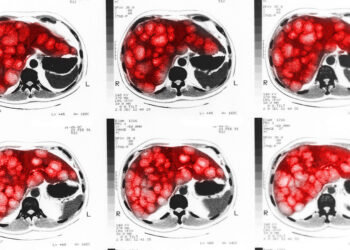Cancer patients should seek medical advice before using weight-loss injections, a leading UK charity has said.
Macmillan Cancer Support urged patients not to view these drugs as “quick fixes,” following a rise in helpline queries over whether they should take them.
Obesity is a well-established risk factor for several cancer types and is linked to worse outcomes in patients who already have a cancer diagnosis.
GLP-1 receptor agonists (GLP-1 RAs) have seen rapid uptake for weight loss. Their popularity has helped fuel speculation that they could reduce the risk for cancer or improve outcomes in people with obesity-related cancers.
Mixed Findings on Cancer Risk and Benefits
A study published in The Lancet eClinical Medicine in May compared outcomes in patients treated with GLP-1 RAs vs bariatric surgery. The research involved 3178 age- and BMI-matched pairs in Israel.
Despite surgery achieving greater weight loss, both groups had similar rates of obesity-related cancers. The researchers suggested that there could be additional pathways beyond weight loss through which GLP-1 RAs might lower cancer risk, for example by reducing inflammation.
Other experts have proposed additional pathways, including enhanced immune responses, improved insulin sensitivity, hormonal modulation, and changes to gut microbiome. As a result of the study, clinical trials of GLP-1 RAs as potential anticancer agents are planned.
Potential Risks: Thyroid and Pancreatic Cancer
Some studies have suggested that GLP-1 RAs carry a minor increase in the risk for thyroid cancer, which is one of the 13 cancers known to be linked with obesity. Some GLP-1 RAs now carry warnings about this potential link, although the evidence is conflicting.
One meta-analysis of 64 studies by Italian researchers, published in March 2024, found a significant increase in overall thyroid cancer risk. However, the data did not show a significant rise in papillary or medullary thyroid cancer when analysed separately.
The researchers concluded that GLP-1 RA treatment could be associated with a moderate increase in the relative risk for thyroid cancer, though the absolute risk remained small. They called for longer-term studies to clarify the link.
In contrast, a Scandinavian cohort study published in April found no substantial increase in thyroid cancer risk over an average follow-up of 3.9 years. The authors said the findings did not rule out a slight increase but suggested no more than a 31% relative risk rise.
Similar concerns have been raised about a theoretical risk for pancreatic cancer, but no conclusive evidence has been found.
Macmillan Helpline Sees Spike in Inquiries
Following recent media coverage, Macmillan Cancer Support reported a surge in calls and messages about weight-loss medications, including the potential risk to people with thyroid cancer.
Dr Owen Carter, Macmillan’s national clinical advisor, said in a press release that there had been “a noticeable increase” in calls to the charity’s free support line, alongside “a flurry of messages” on its peer-to-peer online community platform.
In response, the charity has published updated information about weight-loss injections and cancer on its website.
Carter said that some callers were concerned about taking weight-loss drugs while undergoing cancer treatments such as chemotherapy or hormone therapy.
While there is currently not enough evidence, “we do know that these drugs may affect how other drugs are absorbed by your body,” he said. “This may include some anticancer drugs.”
Weight Loss Before Surgery and Prehabilitation
Other patients have asked whether weight-loss medication is safe to take before surgery for cancer.
“Understandably, people are keen to do what they can to get ready for cancer treatment,” Carter said.
Healthcare professionals often recommend prehabilitation to help patients prepare for treatment by improving their fitness and overall health.
However, Carter warned against unprescribed use of weight-loss injections as “quick fixes.”
“We simply do not know enough about the long-term impact of these weight-loss medications to recommend them if they’re not prescribed by a specialist,” he said.
Carter also emphasised the importance of making lifestyle changes alongside use of medications.
“We know that eating well and staying as active as possible are proven to help people feel better, increase their energy levels, and strengthen their immune systems, which can help them to manage their weight and cope better with cancer treatment,” he said.
Risks of Unregulated Online Purchases
Macmillan also raised concerns about people buying GLP-1 RAs online from unregulated sources.
Some patients are reported to have experienced severe side effects from counterfeit medicines. The charity urged people to speak to their GP before taking weight-loss drugs.
Macmillan noted that potential side effects of GLP-1 RAs include nausea and vomiting, abdominal pain, diarrhoea or constipation, and fatigue.
They can also reduce the effectiveness of oral contraceptives. There have been reports of unplanned pregnancies occurring while taking these drugs, which may be particularly hazardous in cancer patients, as some cancer treatments are teratogenic.
Dr Sheena Meredith is an established medical writer, editor, and consultant in healthcare communications, with extensive experience writing for medical professionals and the general public. She is qualified in medicine and in law and medical ethics.
Source link : https://www.medscape.com/viewarticle/cancer-concerns-spark-caution-over-weight-loss-injections-2025a1000gju?src=rss
Author :
Publish date : 2025-06-20 17:10:00
Copyright for syndicated content belongs to the linked Source.














